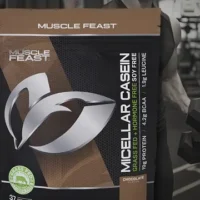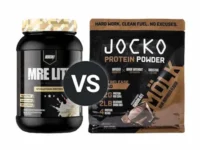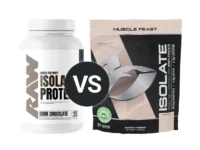Knowledge BaseYou're Questions Answered
Do lean protein shakes work?
Lean protein shakes are formulated to provide high-quality protein with minimal fats and carbohydrates. They are often used to support weight management, muscle building, and overall nutrition. The effectiveness of lean protein shakes can vary depending on individual goals, dietary habits, and how they are incorporated into a broader nutritional and exercise plan. Below, we explore the benefits and considerations of using lean protein shakes.
Benefits of Lean Protein Shakes
-
Support for Muscle Building and Recovery
Lean protein shakes are an excellent source of high-quality protein, which is essential for muscle repair and growth. Consuming adequate protein after exercise helps stimulate muscle protein synthesis, leading to improved recovery and muscle development. A study published in the American Journal of Clinical Nutrition found that protein supplementation after resistance training significantly enhances muscle mass and strength1.
-
Weight Management
Lean protein shakes can be an effective tool for weight management. Protein has a high satiety value, meaning it helps you feel full for longer, which can reduce overall calorie intake. Additionally, protein has a higher thermic effect of food (TEF) compared to fats and carbohydrates, meaning the body burns more calories digesting and metabolizing protein. This can contribute to a caloric deficit, which is necessary for weight loss2.
-
Nutrient-Dense and Convenient
Lean protein shakes often contain added vitamins and minerals, making them a nutrient-dense option for those looking to supplement their diet. They are convenient for busy individuals who may not have time to prepare high-protein meals, providing a quick and easy way to meet protein needs on the go.
-
Versatility
Lean protein shakes can be used in various ways, such as meal replacements, post-workout recovery drinks, or snacks between meals. Their versatility makes them suitable for different dietary strategies and preferences, whether the goal is to build muscle, lose weight, or maintain overall health.
Considerations
-
Quality of Ingredients
The effectiveness of lean protein shakes depends on the quality of the protein and other ingredients used. It is important to choose shakes that contain high-quality protein sources, such as whey, casein, or plant-based proteins, and to avoid those with excessive added sugars or artificial ingredients.
-
Balanced Diet
While lean protein shakes can be beneficial, they should not replace whole foods entirely. It is important to maintain a balanced diet that includes a variety of nutrient-dense foods such as fruits, vegetables, whole grains, and healthy fats. Lean protein shakes should complement a healthy diet, not replace it.
-
Individual Needs and Goals
The effectiveness of lean protein shakes will vary based on individual needs and goals. For example, athletes and individuals with high physical activity levels may require more protein for muscle repair and growth, while those focusing on weight loss might use protein shakes to control hunger and reduce overall calorie intake. Consulting with a healthcare professional or nutritionist can help tailor protein intake to individual needs.
In Summary
Lean protein shakes can be an effective tool for muscle building, recovery, and weight management when used as part of a balanced diet and exercise regimen. They provide high-quality protein, enhance satiety, and offer convenience for busy lifestyles. However, it is important to choose high-quality products and integrate them into a comprehensive dietary plan to achieve optimal results. Consulting with a healthcare professional can further ensure that lean protein shakes meet individual health and fitness goals.
- Phillips, S. M., & Van Loon, L. J. (2011). Dietary protein for athletes: From requirements to optimum adaptation. American Journal of Clinical Nutrition, 94(6), 1721S-1726S.
- Westerterp-Plantenga, M. S., Lejeune, M. P., Nijs, I., van Ooijen, M., & Kovacs, E. M. (2004). High protein intake sustains weight maintenance after body weight loss in humans. International Journal of Obesity, 28(1), 57-64.
Related Questions

Your Answer
We are a participant in the Amazon Services LLC Associates Program, an affiliate advertising program designed to provide a means for us to earn fees by linking to Amazon.com and affiliated sites.






